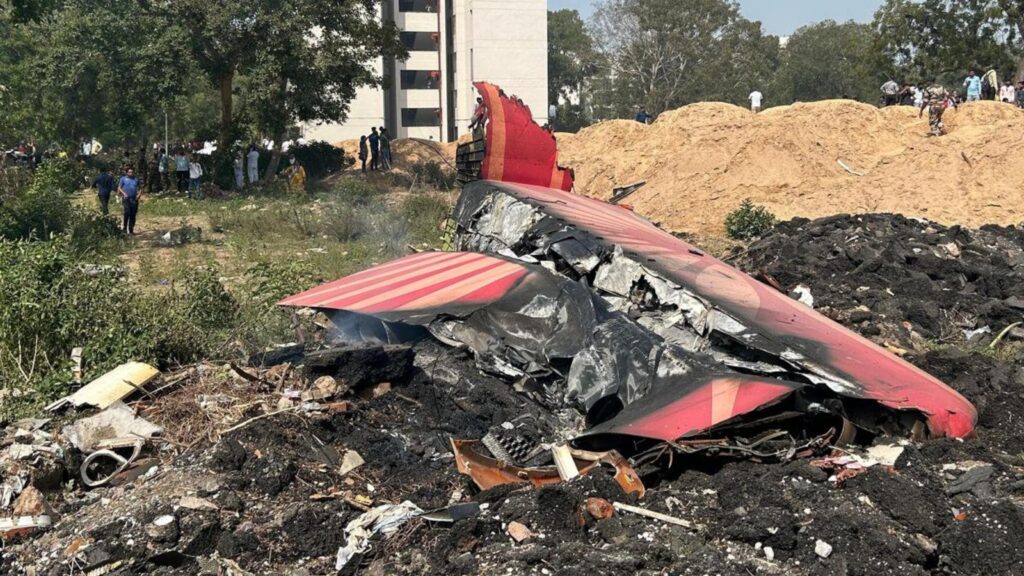
DGCA Seeks Air India Pilot Training Logs: The Directorate General of Civil Aviation (DGCA) has intensified its investigation into the tragic Air India Flight AI171 crash that occurred on June 12, 2025, near Ahmedabad. The regulatory body has officially directed Air India to submit complete training records for the pilots and dispatcher involved in the fatal incident. This move reflects growing concerns over the quality of pilot training and emergency preparedness within the Indian aviation sector.
Table of Contents
🛬 Background: The Ahmedabad Tragedy
On June 12, Air India Flight AI171, a Boeing 787 Dreamliner, was en route from Ahmedabad to London Gatwick when it crashed shortly after takeoff. The accident claimed the lives of 241 people, with only one survivor, and caused significant damage on the ground due to falling debris.
The crash sent shockwaves across the aviation industry, prompting a multi-agency investigation involving the DGCA, Aircraft Accident Investigation Bureau (AAIB), and international aviation experts.
📋 What the DGCA Has Demanded
In a formal notice, the DGCA has asked Air India to submit:
Detailed pilot training records for Captain Sumeet Sabharwal and First Officer Clive Kunder
Certification logs of instructors responsible for their training
Performance evaluations, simulator training details, and refresher course history
Dispatcher records related to flight planning and emergency protocol
The request aims to assess whether any training lapses or procedural weaknesses contributed to the crash.
👤 Pilot Profiles Under Scrutiny
Captain Sumeet Sabharwal
A senior commander with over 8,000 flying hours, including experience on multiple Boeing models
Previously served as a flight instructor for Air India
Held a valid license and recent proficiency checks
First Officer Clive Kunder
Accumulated approximately 1,100 flight hours
Considered junior by industry standards for long-haul international flights
Underwent training in 2024, but the DGCA seeks to verify its scope and compliance
This investigation will also examine how both crew members handled the emergency in the final moments and whether CRM (Crew Resource Management) standards were properly applied.
🗂️ Dispatcher Records Also Requested
The DGCA has also demanded dispatcher logs to evaluate the pre-flight planning process, weather assessments, and communication during the unfolding emergency. Dispatchers play a vital role in monitoring aircraft performance and supporting flight crews from the ground during emergencies.
⚖️ What’s at Stake for Air India
Air India, now owned by the Tata Group, is under intense scrutiny. While the airline is undergoing restructuring to improve service quality and safety standards, this incident could mark a major setback unless handled with full transparency.
Key areas of concern:
Training quality across fleet types
Emergency preparedness
Compliance with DGCA’s pilot proficiency rules
Dispatcher coordination protocols
Sources indicate that the DGCA may impose system-wide audits on other airlines if significant lapses are discovered in this case.
🛡️ Wider Industry Impact
This tragic event is likely to reshape Indian aviation in multiple ways:
Mandatory audits of pilot training programs across all airlines.
Strengthening of crew certification protocols.
Emergency drills have already been ordered across all government-run airports.
Possible reforms in flight school regulation and oversight.
Aviation analysts warn that India’s rapid air traffic growth must be matched with strong safety systems, especially as the country expands its global aviation footprint.
🔍 What Happens Next?
The Aircraft Accident Investigation Bureau (AAIB) is preparing a detailed report expected within 30–45 days
The DGCA will review Air India’s training documentation and may introduce new policy guidelines
Air India has pledged full cooperation and will likely announce internal reforms and reviews
✈️ Conclusion
The Air India Boeing 787 crash in Ahmedabad is a grim reminder that aviation safety must be proactive, not reactive. With the DGCA now focusing on pilot training and dispatcher performance, the outcome of this investigation could shape aviation policy for years to come. Transparency, accountability, and rapid reforms are now essential—not only to restore public confidence but to ensure such tragedies never happen again.
For mmore details click here.
